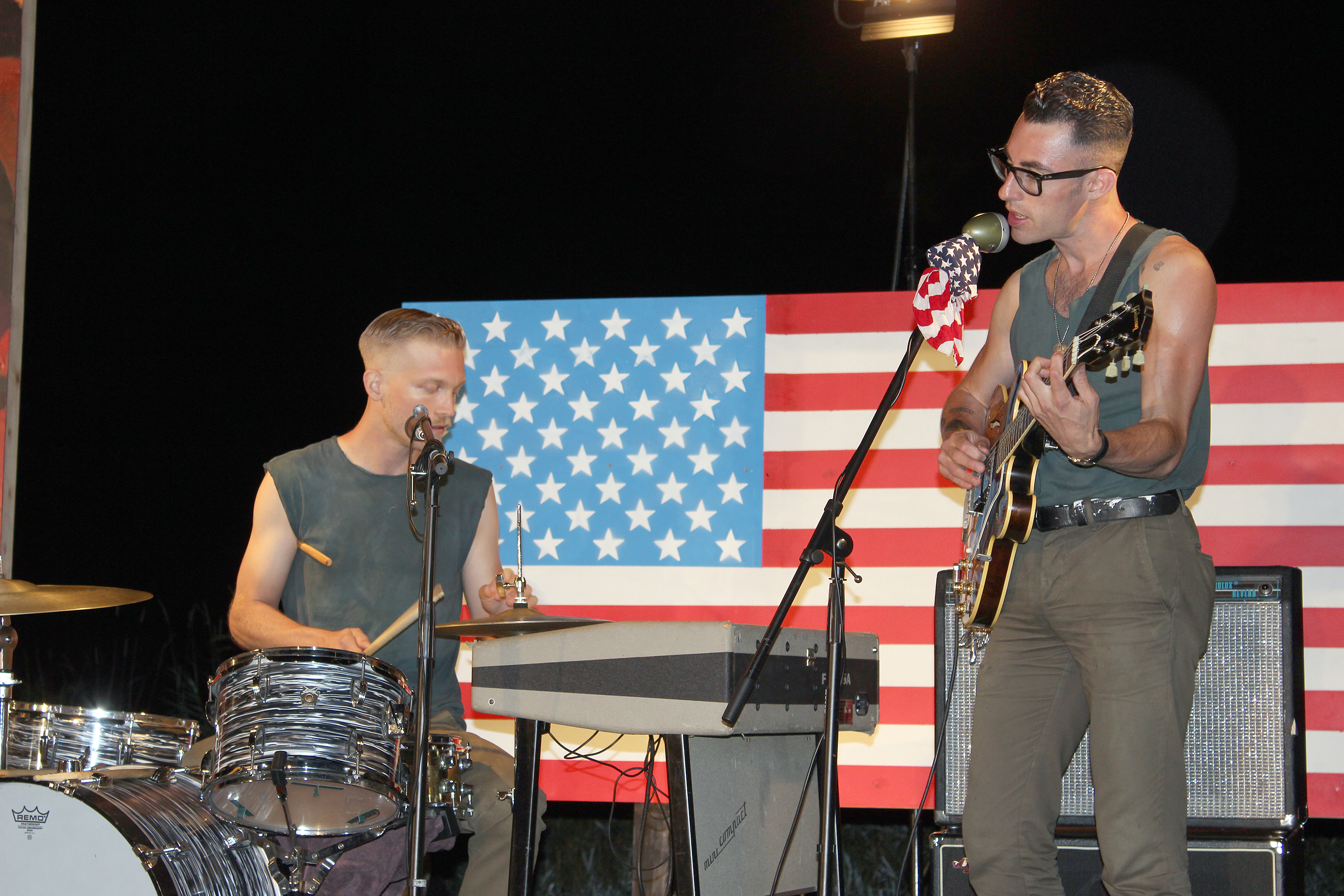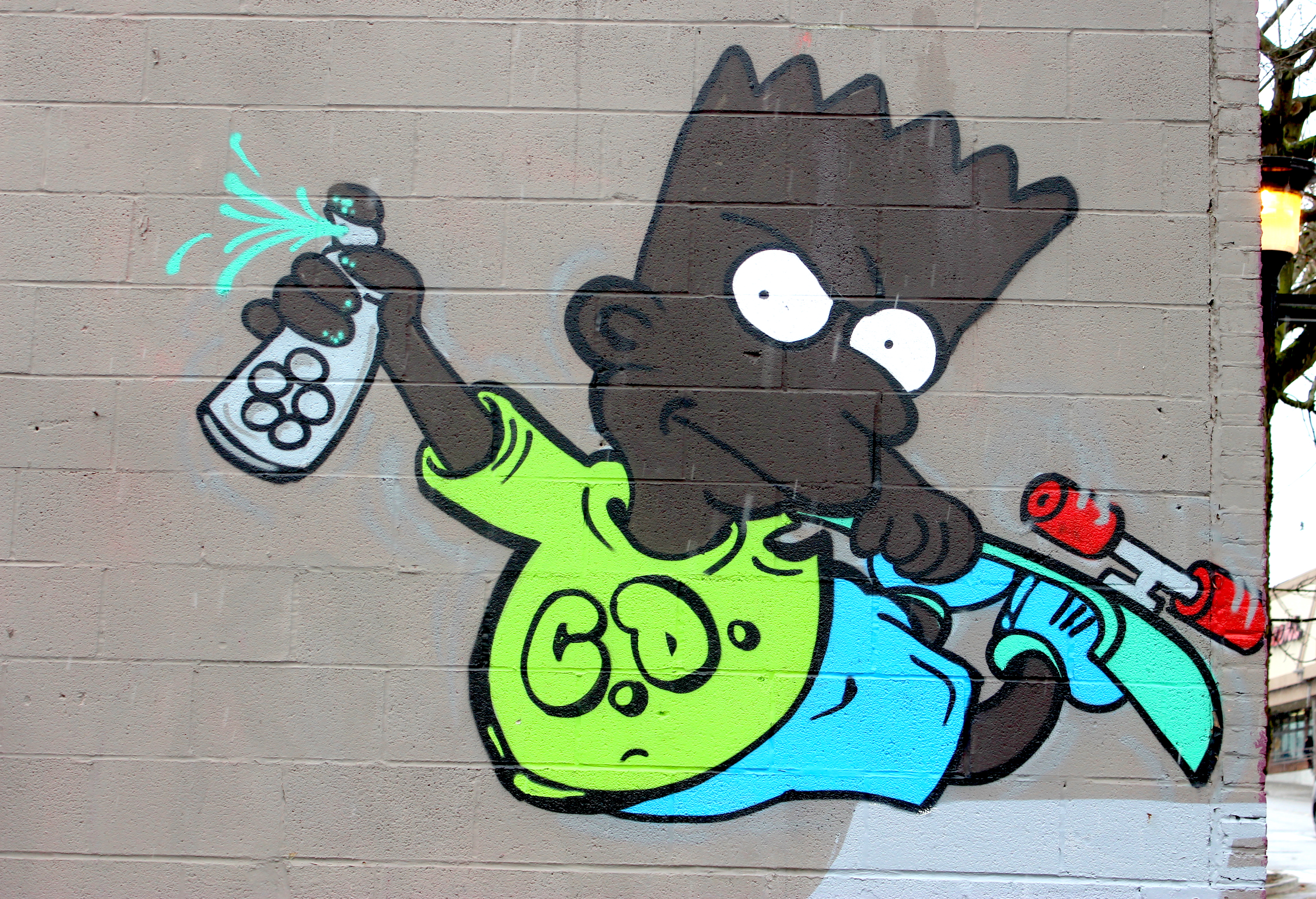Ben Verdoes pulls up to the Park & Ride lot in Stanwood wearing a military green tank top and a fresh close-cropped haircut.
“Welcome, soldiers,” he says softly to the group of friends, acquaintances, and random kids waiting for him. “Uh . . . thanks so much for coming out. We’re going to take you over to . . . boot camp now. The set is looking great, you guys, I’m really excited. Thanks so much for . . . reporting for duty.”
I am one of about 50 or so extras who have voluntarily driven to Snohomish County on this late-summer Saturday to help film a new music video for Verdoes’ band Iska Dhaaf. Half of local hip-hop group Kingdom Crumbs is in attendance, as is John Van Deusen from indie-rock group The Lonely Forest and members of a slew of Bellingham bands, including Specters and the now-defunct Cat From Hue. The shoot is for the song “Everybody Knows,” a tune yet to be released but which is still stuck in my head from a house show the band played a couple weeks prior in a Central District basement.
Verdoes, the group’s drummer, is an exceedingly polite man—a tall blond whose soft-spokenness likely lends itself well to his day job as a teacher. As he explains what all we extras are about to get into, his pleasant demeanor is undermining his drill-sergeant shtick.
“All right, soldiers,” Verdoes says, doing his best R. Lee Ermey impression. “We’ve got uniforms ready for you over at camp. So you all best suit up and . . . uh . . . yeah! Thanks again for coming. Seriously, it means so much to us.”
The video-shoot turnout is a testament to Iska Dhaaf’s rapid rise. After releasing only four songs, the duo of Verdoes and guitarist/singer Nathan Quiroga has played shows in Alaska, at the Capitol Hill Block Party, and in live sessions on KEXP and The End. Nearly everywhere the band has gone, they’ve been met with rave reviews and rapturous crowds. Both times I’ve seen the band, a mosh pit erupted—quite a feat considering Iska Dhaaf’s existence was something of a secret until this July, when they surprised everyone with the release of the incredibly hooky debut single “All the Kids.”
A lot of things about Iska Dhaaf are surprising, actually. Chief among them is the unlikely friendship that led to the formation of the punked-out two-piece: Verdoes, a family man from a math-rock background, finding kinship with Quiroga, best known in Seattle for his polarizing antics as a shit-starting rapper.
In 2010, Quiroga graced the cover of City Arts, rotten tomatoes smashed into his hair, the headline blaring “What it’s like to be HATED.” Indeed, Quiroga and his crew of hip-hop hedonists, Mad Rad, earned the title “notorious” over their five-year career, getting banned from five Seattle venues for their debauchery. One incident, a brawl that broke out at Neumos in 2009, briefly landed Quiroga and two bandmates in jail for drunkenly picking a fight with the club’s security guards.
“Every show was like a battle between me and the crowd,” Quiroga says. “I had to go as hard as I could to make them love it, whatever it took.”
The group went as hard on the street as onstage, battling postering teams for prime real estate on the poster wall at 11th and Pine. An enormous “MAD RAD” wheatpaste loomed over Capitol Hill for the better part of two years thanks to the group’s unyielding diligence. “People would come and take it down, so we’d put it up bigger. Then they’d take it down again, so we’d put another one up that was even bigger,” Quiroga says.
Due to a mix of this insanity and the band’s uncanny knack for self-promotion, Mad Rad sold out shows and raked in press, their chirpy, electronica-influenced take on hip-hop receiving notice from Spin and NPR. Quiroga rapped lines like “Pills, powder, going under/The world’s a whore and I’ll always love her,” while articles detailed his love affair with whiskey and Rainier.
As Quiroga was cultivating an image as an alcohol-swilling poet of the putrid, Verdoes was earning a very different reputation. Before playing a single show, his math-rock group Mt. St. Helens Vietnam Band received national media attention for the few songs it had uploaded to Myspace and the goofy promotional videos it had released—fake Public Service Announcements featuring flying cheeseburgers and purposefully awful green-screen effects.
The band was soon out on long national tours. Over three years Verdoes oversaw the release of two full-lengths and an EP of highly complex indie-rock tunes, full of sudden time-signature shifts and byzantine song structures, that earned them local praise and national notice.
The momentum was incredible for a project that had started as a way to teach Verdoes’ adopted brother Marshall, who calls Verdoes his legal guardian, how to play drums. He was only 13 when Mt. St. Helens Vietnam Band initially took off, and Verdoes home-schooled Marshall on the road and between concerts. At showtime, Marshall would climb behind the drums and pound out the complicated time signatures that anchored the band. Not only was Verdoes a rockstar, but he was also effectively a father, juggling separate but related identities that often weighed heavily due to their respective responsibilities.
Verdoes and Quiroga both charged ahead in their lives and their musical careers at full speed. Yet, despite their respective success, both musicians wanted something different, something more. Quiroga found himself in a creative roadblock with Mad Rad, unhappy with the party-hard environment he’d locked himself into and the limits he felt the band was beginning to place on his songwriting. Meanwhile, Verdoes was looking for a musical outlet that felt a bit freer, where he could focus fully and solely on the music. He found himself wanting to make hip-hop beats, fascinated with Quiroga’s songwriting in Mad Rad and the band’s similar work ethic.
“Mad Rad and Mt. St. Helens were the two best promoters of our own shit,” Verdoes explains, chumming it up with Quiroga in a Capitol Hill coffee shop weeks after their video shoot. “We were working the hardest. I had this appreciation for Mad Rad on the basic level of strategy and promotion. I was just like, ‘These guys are fucking killing it.’ ”
After an introduction by KEXP DJ Sharlese Metcalf, the two artists started a friendship. Verdoes played guitar with Mad Rad at the Capitol Hill Block Party in 2011.
In one fateful moment, Verdoes remembers turning to Quiroga’s girlfriend. “He doesn’t know it yet, but I’m going to start a band with Nate,” he remembers telling her. “He’s the best songwriter in town.”
Within a few months, Verdoes and Quiroga were practicing and writing almost every day. They did this for the better part of two years as their other bands dissolved, holing up in secret, painstakingly sending songs back and forth. The long incubation period was due in part to the high standards the two set for each other. “I’m just glad I met someone who can keep up with me,” Verdoes says. “I have a hard time keeping up with Nate a lot of the time.”
Verdoes has been learning Somali for years. A former teacher for bilingual students at Bailey Gatzert Elementary School, located in a largely Somali neighborhood, Verdoes began to notice how difficult learning English was. “I saw how hard they were working to learn English, and when I started learning some of their words, I saw how much of a connection language forms,” Verdoes says. “But then I just fell in love with the sound of it; the words will get stuck in my head like songs do.”
Verdoes initially met his girlfriend, Ifrah Ahmed, at Bailey Gatzert, where she was also teaching at the time. The two hit it off, bonding over Walt Whitman. When Verdoes found out Ahmed was also Somali, he asked her to help him learn the language. She was the one who taught Verdoes the phrase “Iska dhaaf.” Loosely translated as “Let it go,” the phrase quickly found its way into the band’s early practices and writing sessions.
“We would get into situations where something would be really difficult in a song, and we would just obsess over it,” Verdoes says. “One of us would start to crack and get to that point where you start telling yourself, ‘I can’t do this, I can’t do this.’ We would tell each other that phrase ‘Iska dhaaf’ a lot as a way of being, like, ‘Forget it.’ And then we’d just go ‘All right,’ and move on.”
When the group started talking about band names, the name stuck, its meaning emblematic of the project’s cathartic, redemptive quality.
“All the Kids,” Iska Dhaaf’s unreasonably catchy first single, doesn’t sound like an attempt at redemption upon first listen. Musically, the surfy guitars, pumping Farfisa bass, and skittering punk drums feel more like cruising through the Sahara on a motorcycle with your shades on. Only when you listen closely to the words do you realize the song’s hidden heft.
All the kids I kicked it with were drunk.
We sniffed the stars away and hate the sun.
All we ever did was get fucked up.
The planet spins another friend falls off.
“I was really just trying to purge myself through that song,” Quiroga says. “I’m trying to get rid of all the guilt I have from the shit I did when I was fucked up.”
If the duo’s first batch of songs was an attempt at inward purification, their next project is decidedly outward in its aims. This winter, Iska Dhaaf will release an EP themed on the subject of drone warfare. The video shot in Stanwood, along with at least two others, will function as an accompanying piece, a narrative saga with fully fleshed-out characters and interlocking plots.
“I had just gotten the Internet,” Quiroga says. “So I asked Ifrah, ‘Hey! What should I read on here?’ She sent me an article about drones.”
Verdoes nods. “And then we got obsessed.”
Soon Quiroga and Verdoes were exchanging passages from apocalyptic T.S. Eliot poems, Jarhead, parts of the Biblical book of Isaiah, and scenes from Ishmael Beah’s A Long Way Gone: Memoirs of a Boy Soldier as potential sources for the ambitious project.
“I was reading all this stuff and starting wondering, what would happen if someone blew Nate’s brains out in front of me?” Verdoes says.
The feeling was intensified by Verdoes’ interactions with his his students from Somalia, a center for many U.S. military drone strikes.
“I read these kids’ writings for class where they talk about these insane things they’ve been though,” Verdoes says. “It feels very close to me.”
Back on the music-video set in Stanwood, Verdoes and Quiroga are behind their instruments, poised in front of a giant mock-up of the American flag. A painted backdrop riffing on the opening helicopter scene from Apocalypse Now sits next to them. To confront the wars in Somalia, Quiroga and Verdoes are evoking the Vietnam war. The director instructs all of us pretend soldiers to start hooting and hollering when the shot begins.
After about four or five run-throughs, an extra sitting next to me starts humming the chorus to “Everybody Knows.” It’s not only stuck in my head, but his too.
ksears@seattleweekly.com
ISKA DHAAF Barboza, 925 E. Pike St., 709-9951, thebarboza.com. With Budo. 8 p.m. $10 adv. 8 p.m. Thurs., Oct. 10.








